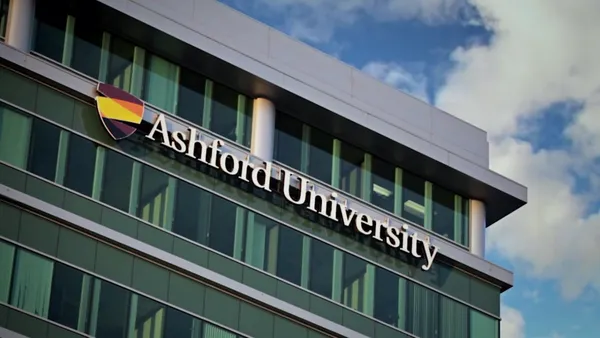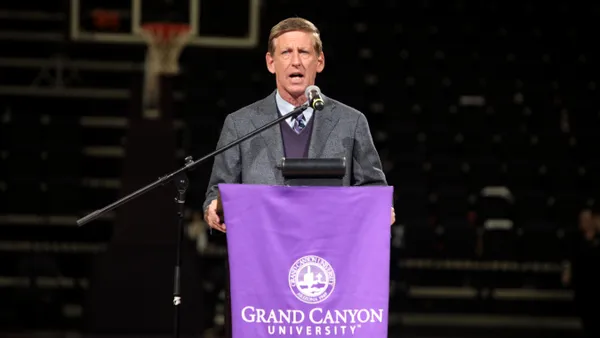Dive Brief:
- The private, nonprofit National University System (NUS) on Monday finalized its acquisition of the for-profit Northcentral University, which will become part of NUS as a nonprofit affiliate. NUS did not disclose the deal price.
- In a press release emailed to Education Dive, NUS — which operates National University, John F. Kennedy University and City University of Seattle — said the deal represents "a significant expansion of the National University System's academic offerings from pre-college to the doctoral level." Northcentral currently offers 22 doctoral and 25 master's programs, all online. Fields include nursing, cybersecurity, education, business and health administration.
- The ownership and structure change have been approved by both institutions' accreditor, WASC Senior College and University Commission. Northcentral Provost David Harpool will become the university's new president, effective this month.
Dive Insight:
NUS, which enrolls more than 45,000 students across its affiliates, framed its acquisition around college access for working adults and through Northcentral's online offerings.
The deal comes as more students are taking online courses even as overall enrollment levels waver. According to data from the National Center for Education Statistics, 15.4% of college students took only distance education courses in the fall of 2017. The share was higher for students at private for-profit (49.1%) and private nonprofit (19.1%) colleges. The total figure is up from 14.7% in the fall of 2016.
Northcentral, for its part, touts its "one-to-one" model in which students and faculty are paired for online instruction rather than "impersonal classrooms filled with warm bodies represented by an alphabetized roster," its website says. Founded in 1996 in Arizona, it enrolled around 10,000 students, most of them in graduate programs, prior to joining NUS.
This fall, students of the for-profit college filed a class-action lawsuit against it, alleging its doctoral programs were "essentially bait-and-switch operations," with marketing that downplayed the length and cost of the programs. As of Monday, plaintiffs still had not served Northcentral with the complaint, according to court records. A spokesperson for NUS told Education Dive the lawsuit was resolved prior to the acquisition's completion.
The legal, reputational and regulatory risks associated with the for-profit sector are driving a wide-ranging shake-up and revision of the model. Some for-profits have converted directly to nonprofits, and in several cases those changes have drawn scrutiny over the potential for conflicts of interest and self-dealing with the colleges keeping tight financial or governance ties to former owners.
Grand Canyon University (GCU), for example, split off from its for-profit owner, Grand Canyon Education (GCE), the latter changing its model to become a services provider. However, until it acquired health program specialist Orbis Education Services, GCE was an educational services company with a single client: GCU. The university's president is also the CEO of GCE. The Century Foundation has found evidence of several nonprofit conversions that had financial arrangements with former owners or other insiders that would allow them to profit from university operations.
Other for-profits have, like Northcentral, been acquired by existing nonprofit operators with strong reputations. That would include Purdue University's $1 acquisition of Kaplan University. The deal, finalized in March, turned the for-profit college into the basis for the online Purdue University Global, a public benefit corporation. The acquisition, like NUS's purchase of Northcentral, greatly expanded Purdue's reach in online education. It also included a controversial revenue-sharing component, with Kaplan managing several back-office functions of the new college.
In the case of the Northcentral acquisition, Bob Shireman, a senior fellow at The Century Foundation, listed the deal in a report as an example of one in which the "purchase price was determined and financed independently and there is no ongoing contract or relationship between the nonprofit and the former owners."














